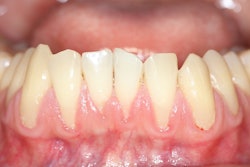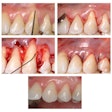Taking antidepressants may reduce the risk of developing gum disease, especially the most severe forms of gum inflammation, according to a large U.S. study published on October 29 in the Journal of Periodontology.
Since this study suggests that antidepressants may protect against gum disease, further research should be conducted, the authors wrote.
“These findings suggest plausible beneficial role of antidepressants on periodontitis,” wrote the authors, led by Dr. María Martínez of the University Complutense of Madrid.
It has been shown that there is a bidirectional link between gum disease and major depression. However, antidepressants’ effects on periodontal health remain unclear, according to the study.
This study isn’t the first one to show that antidepressants benefit oral health.
In April, a review published in the Journal of Oral Rehabilitation showed that combining antidepressants with treatments like oral appliances may help relieve pain and improve function in patients with a chronic temporomandibular disorder (TMD).
To explore the correlation between antidepressant use and the prevalence of periodontitis in a large U.S. population, U.S. National Health and Nutrition Examination Survey (NHANES) 2009-2014 data from 9,839 patients were analyzed. Of the participants, about 35% had moderate periodontitis and 11% had severe gum disease, the authors wrote.
Antidepressant use was recorded from the data, and periodontal status was assessed through full-mouth evaluations. Adjusted odds ratios (ORs) were calculated using logistic regression models, they wrote.
Using antidepressants was linked to decreased odds of developing periodontitis, specifically in severe cases. For those with advanced periodontitis (stages III or IV), the adjusted OR was 0.68 (95% confidence interval [CI]: 0.54 to 0.86). For those with severe gum disease, the OR was 0.41 (95% CI: 0.26 to 0.66), the authors wrote.
Despite the study's strengths, it had limitations. Due to its observational and cross-sectional design, it precluded causal inferences, they wrote.
“While the relationship between depression and periodontitis remains complex and influenced by shared risk factors, this study suggests findings that may reflect a beneficial effect of antidepressants on periodontal health,” Martinez and co-authors wrote.




















